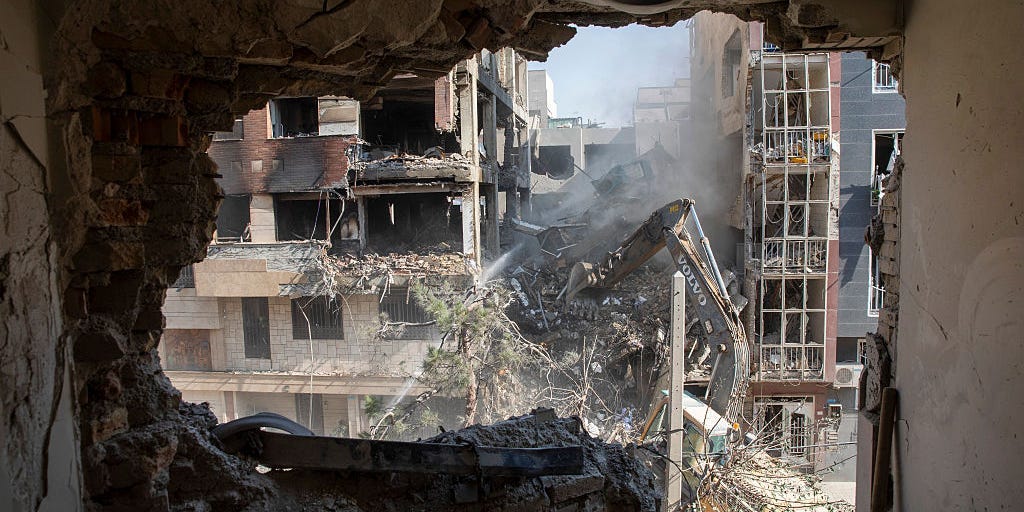X
Copy link
Impact Link
Save
Saved
Read in app
subscribers. Become an Insider
and start reading now.
Have an account? .
- Israel and Iran agreed to a ceasefire on Tuesday after 12 days of airstrikes and missile attacks.
- Israel targeted Iran’s nuclear program, and the US dropped bombs on Iranian nuclear facilities.
- Photos show damaged sites in both Israel and Iran in the aftermath of the war.
The damage is done.
After 12 days of airstrikes, drones, and missile attacks, including US airstrikes on Iranian nuclear sites ordered by President Donald Trump, Israel and Iran agreed to a ceasefire brokered by Trump on Tuesday.
The “12 Day War” began on June 13 when Israel launched a surprise attack it said was a preemptive strike against Iran’s nuclear program to prevent it from developing nuclear weapons. Iran retaliated with a barrage of missiles and drones directed at Israel.
In Israel, 28 people died and over 3,000 were injured, according to Israel’s Health Ministry. Iranian state media reported that 627 people died and at least 4,870 were wounded in Iran.
Whether the US and Israel succeeded in halting Iran’s nuclear program remains unclear. The White House maintains that Iran’s nuclear facilities were “obliterated,” while a classified US intelligence assessment reported that the attacks may have only delayed Iran’s developments by a few months.
Photos show the aftermath of the war in Israel and Iran.
On June 13, Israel launched a surprise attack on Iran targeting its nuclear and military facilities.
Israel also struck the homes of Iranian nuclear scientists in Tehran and Marzdaran.
The airstrikes left gaping holes in residential buildings in Tehran.
Iran responded with retaliatory strikes aimed at Israel.
Israeli air defense systems intercepted some of the incoming surface-to-surface missiles, but some hit their targets.
Iranian missiles damaged buildings and wounded civilians in the Israeli cities of Tel Aviv, Bat Yam, and Bnei Brak.
Israel struck an Iranian state media building in Tehran on June 16, calling it a “terror-linked propaganda infrastructure.”
Israel also bombed Evin Prison in Tehran, known for imprisoning political dissidents and journalists.
Vehicles jammed highways in Iran as residents fled Tehran.
Tel Aviv canceled its annual Pride Parade as Israeli citizens were ordered to shelter in place.
Parking garages and underground stations across Israel became temporary bomb shelters.
An Iranian missile hit Soroka Medical Center in Beersheba on June 19, injuring 71, according to Israel’s Health Ministry.
Smoke lingered in the skies of Tehran as Israel continued its bombing of Iran.
Stores were shuttered at Tehran’s Grand Bazaar as Iranians took cover from Israeli airstrikes.
Businesses like beauty salons were demolished in the strikes on Tehran.
Fire was visible in the mountains of Shiraz, where the Israel Defense Forces said they struck a missile launch site.
Satellite imagery showed damage done to Iranian nuclear sites, including a nuclear technology center in Isfahan.
After the US joined the fray and dropped “bunker buster” bombs on Iranian nuclear sites, Iran retaliated by launching missiles at a US military base in Qatar, all of which were intercepted.
A ceasefire agreement was reached on June 24, bringing the 12 days of fighting to a halt.
With a ceasefire in place, both countries began clearing the wreckage of destroyed buildings and burying their dead.
Streets in Iran and Israel slowly returned to normal.
Read the full article here


